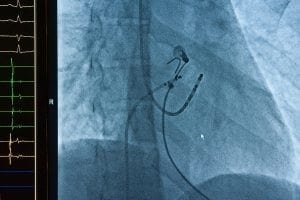Herzliya Medical Center
Tel: +972-9-959-4888
09:00-18:00

This is a medical procedure performed during an electrophysiology study to treat heart rhythm disturbances discovered during the examination. At times, ablation is scheduled for a separate date from the electrophysiology study, but it can be done during the same procedure if needed if this is possible. This is a particularly common treatment of heart rhythm disorders, with success rates of 90%.
The need for ablation is determined by a physician who specializes in electrophysiology, in accordance with clinical findings and non-invasive examinations such as Holter monitor of the heart. Ablation is also performed in cases of heart arrhythmia that do not respond well to treatment with medicines.
Ablation is performed under local anesthesia or intravenous sedation or, if needed, general anesthesia. Catheters are introduced via the femoral artery in the groin and reach the heart chambers relevant for the type of ablation. On completion of the procedure, the catheters are withdrawn, and a local pressure bandage is applied. Throughout the procedure, there is real-time monitoring of heart activity and the patient’s general condition.
A few days before performing the procedure, the physician will give instructions to the patient regarding how to prepare for it. It may be necessary to take certain medicines or to stop taking other medicines. It may be necessary to carry out transesophageal echocardiography shortly before the procedure.
Every medical procedure has risks, but ablation is a very common and safe procedure. The possible risks are bleeding at the site where the catheter is introduced, and damage to blood vessels through which it passes. Also, there is a risk of damage to the heart’s conduction system. As a result of the ablation, the patient may experience discomfort or chest pain for a few days after the treatment. This is typically a normal situation, and it can be treated with regular analgesics, of course after consulting with the physician.
Ablation takes between one and three hours. After completion of the procedure, the patient must rest and remain in the hospital for observation. In most cases, the patient is released from the hospital within 24 hours. After the ablation, the physician’s instructions must be followed exactly. It is necessary to be careful to take medicines and avoid exertion for a few days. It is possible to return to work and to drive a vehicle in accordance with the physician’s instructions. If the patient feels unwell, he must consult with a physician immediately.